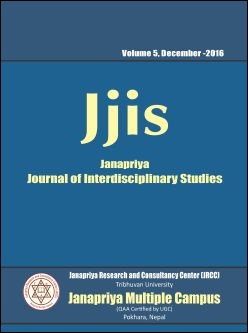Accessing Labour, Resources and Institutions: Women Laborers in Brick Kiln of Jamune Bhanjyang, Tanahun , Nepal
DOI:
https://doi.org/10.3126/jjis.v5i0.17840Keywords:
Bigotry, Brick molding, Gender equality, Kiln, Labour laws, PatriarchyAbstract
The key argument of this paper is that the changing nature of women’s involvement in non-agricultural labor force has added a critical dimension in the development process of Nepal. This relationship between involvement and development has been affected by nature of women’s employment, education, family responsibility and state policy. The major objective of this paper is to analyze critical issues, condition, tribulations and options associated with the livelihoods of women labourers working in brick kiln. For meeting the objectives, qualitative and quantitative data from both primary and secondary sources were used. Primary data were collected via self administered questionnaire, interview, observation and case study. The study findings reveal that due to poverty, low education and skills, many rural women are concentrated in low-skilled and low-paid employment in urban brick kilns where they suffer from gender discriminations, exploitations and male chauvinism in salary, working hours, promotion and facilities. Gender relation has been foremost in determining control over and access to labour, resources, institutions and services. Hence, understanding the different role of women and men is critical to understanding how that system affects women labour, reward, punishment, productivity and sustainability in brick kilns. Policies should consider women labourers easy access to education and information on their rights, as well as supportive institutions and legal measures to ensure their safety, gender rights and encourage private sector development in rural areas that can increase job opportunities for rural women hence reducing their brisk migration to urban areas for job.
Janapriya Journal of Interdisciplinary Studies, Vol. 5 (December 2016), page:56-74



